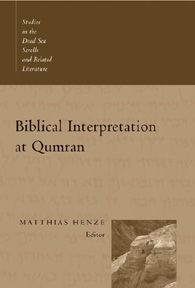Multimedia • Reference • Religion • Travel |
 Biblical Interpretation At Qumran Edited by Matthias Henze
Description From The Publisher: The Dead Sea Scrolls are an invaluable source of information about Jewish biblical interpretation in antiquity. This volume by preeminent scholars in the field examines central aspects of scriptural interpretation as it was practiced at Qumran and discusses their implications for understanding the biblical tradition. While many of the forms of biblical interpretation found in the Scrolls have parallels elsewhere in Jewish literature, other kinds are original to the Scrolls and were unknown prior to the discovery of the caves. These chapters explore examples of biblical interpretation unique to Qumran, including legal exegesis and the Pesher. Readers will also find discussion of such fascinating subjects as the "rewritten Bible," views on the creation of humanity, the "Pseudo-Ezekiel" texts, the pesharim, and the prophet David. Contributors: Moshe J. Bernstein Shani Berrin Monica Brady vGeorge J. Brooke John J. Collins Peter W. Flint Matthias Henze Shlomo A. Koyfman Michael Segal James C. VanderKam Reviews Matthias Henze deserves congratulations for producing one of the first books to study biblical interpretation in light of the new understanding of the Bible. Our oldest evidence — the Dead Sea Scrolls — demonstrates that the Scriptures were pluriform and dynamically growing at the origins of Christianity and rabbinic Judaism. Each essay is an illumination in itself by a leading scholar who has specialized in that topic. The collection is a series of gems offering a richer and more accurate understanding of biblical interpretation in this crucial period. —Eugene Ulrich This book contains very judicious and innovative essays on biblical interpretation in the Qumran scrolls by the major scholars in this area. If this is not the last word on the subject, then it is very close. —Emanuel Tov Matthias Henze has assembled an impressive collection of insightful studies that shed significant light on all of the issues related to biblical interpretation in the texts found in the caves of Qumran. Readers are treated to careful considerations of methods, themes, and several fascinating topics, including interpretation of the law, David as prophet, the pesharim, Psalm 91 as a psalm of exorcism, and others. I recommend this book enthusiastically. —Craig A. Evans Reader's Index Send us your favorite quotes or passages from this book. About the Author Matthias Henze is Watt J. and Lilly G. Jackson Associate Professor in Biblical Studies at Rice University, Houston, Texas. Table of Contents Preface Contributors Diacritical Marks, Sigla, and Abbreviations Introduction Between Bible and Rewritten Bible Interpretations of the Creation of Humanity
in the Dead Sea Scrolls Sinai Revisited The Interpretation of Biblical Law in the Dead Sea Scrolls:
Forms and Methods Biblical Interpretation in the "Pseudo-Ezekiel" Fragments
(4Q383-391) from Cave Four Qumran Pesharim Thematic Commentaries on Prophetic Scriptures The Prophet David at Qumran Psalm 91 in Premodern Interpretation and at Qumran Select Bibliography Index of Modern Authors Index of Ancient Literature Customer Reviews Write your own online review. Look for Similar Books by Subject | |||||||
Copyright ©1996-2006 CenturyOne Bookstore. All Rights Reserved. All prices subject to change and given in U.S. dollars. Your purchase from CenturyOne.com will assist the CenturyOne Foundation in providing funding for various archaeological and research projects which seek to provide more information about the period of the First Century C.E., the origins of Christianity and the world of the Bible in general. All materials contained in http://www.centuryone.com are protected by copyright and trademark laws and may not be used for any purpose whatsoever other than private, non-commercial viewing purposes. Derivative works and other unauthorized copying or use of stills, video footage, text or graphics is expressly prohibited. |

